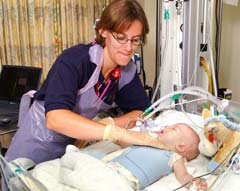Study aims to revolutionise chest physiotherapy to babies and children

Senior Physiotherapist Tracey Pond uses the new sensing mat in the Paediatric Intensive Care Unit at Southampotn General Hospital
A new device being developed by researchers at the University of Southampton and Great Ormond Street Hospital is designed to optimise the effectiveness of chest physiotherapy techniques on babies and children suffering from breathing difficulties.
Rachael Gregson, a Research Fellow at the University’s School of Medicine and Great Ormond Street Hospital is leading the research and has developed an innovative sensing mat to measure chest physiotherapy.
Rachael says that although chest physiotherapy has been in use for over 40 years, treatments may vary significantly among practitioners leading to differing levels of effectiveness: ‘Current techniques used are unquantified and their effects on the child’s breathing have not been fully assessed. The sensing mat we have designed is fixed over the child’s chest wall and will measure the pressure between the hand giving the physiotherapy and the chest wall. The child’s breathing will be monitored before, during and after the treatment to discover any changes.’
‘Once we find out which techniques are most effective, the information could then be used in future clinical trials of best practice. We hope the early prototype machine can be refined and streamlined for use as a teaching aid both in hospitals and the home environment. By optimising the physiotherapy techniques in use, children will hopefully enjoy a swifter recovery,’ adds Rachael Gregson.
Children in the intensive care units at both Southampton General Hospital and Great Ormond Street Hospitals will be involved in this multicentre collaboration. A grant from the medical research charity ‘Sport Aiding medical Research for KidS’ (SPARKS) will enable the sensing system to be modified for use in older children.
Media Contact
All latest news from the category: Health and Medicine
This subject area encompasses research and studies in the field of human medicine.
Among the wide-ranging list of topics covered here are anesthesiology, anatomy, surgery, human genetics, hygiene and environmental medicine, internal medicine, neurology, pharmacology, physiology, urology and dental medicine.
Newest articles

A universal framework for spatial biology
SpatialData is a freely accessible tool to unify and integrate data from different omics technologies accounting for spatial information, which can provide holistic insights into health and disease. Biological processes…

How complex biological processes arise
A $20 million grant from the U.S. National Science Foundation (NSF) will support the establishment and operation of the National Synthesis Center for Emergence in the Molecular and Cellular Sciences (NCEMS) at…

Airborne single-photon lidar system achieves high-resolution 3D imaging
Compact, low-power system opens doors for photon-efficient drone and satellite-based environmental monitoring and mapping. Researchers have developed a compact and lightweight single-photon airborne lidar system that can acquire high-resolution 3D…





















